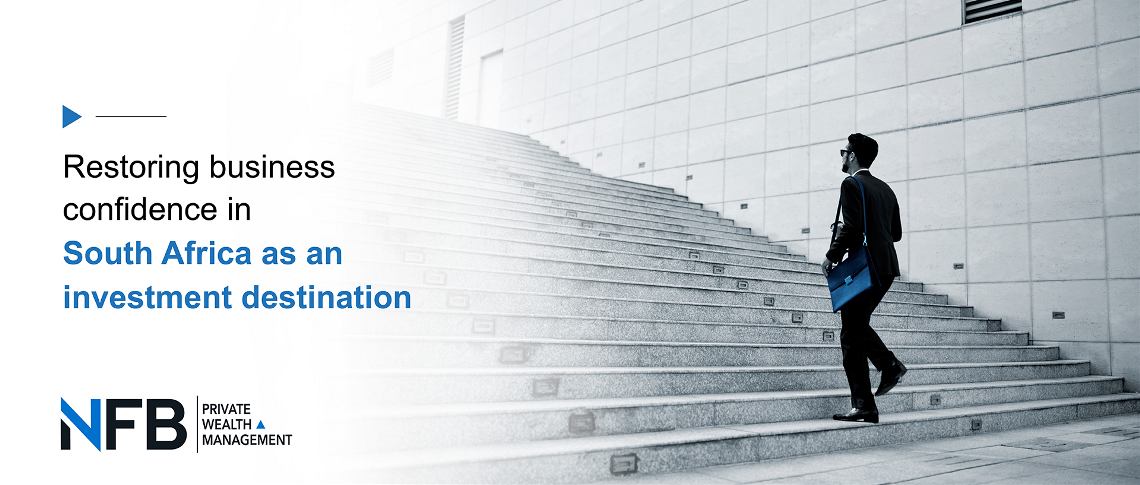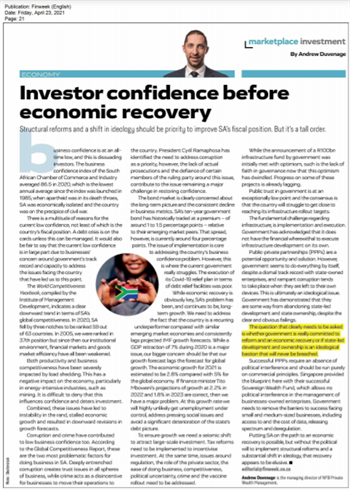Investor confidence before economic recovery
In order for South Africa to achieve any degree of economic recovery it will need to restore investor confidence in the country as an investment destination. That is a tall order in the existing environment.


Business confidence is at an all-time low, and this is dissuading investors. The South African Chamber of Commerce and Industry’s (SACCI’s) business confidence index averaged 86.5 in 2020, the lowest annual average since the index was launched in 1985 when apartheid was in its death throes, SA was economically isolated and the country was on the precipice of civil war.
There is a multitude of reasons for the current low confidence, not least of which is the country’s fiscal position. A debt crisis is on the cards unless this can be managed. It would also be fair to say that the current low confidence is in large part due to businesses’ concern around government’s track record and capacity to address the issues facing the country that have led us to this point.
The World Competitiveness Yearbook, compiled by the Institute of Management Development, indicates a clear downward trend in terms of SA’s global competitiveness. In 2020 SA fell by three notches to be ranked 59 out of 63 countries. In 2005 we were ranked in 37th position but since then our institutional environment, financial markets and goods market efficiency have all been weakened.
Productivity and business competitiveness have both been severely impacted by load shedding. This has a negative impact on the economy, particularly in energy intensive industries like mining. It is difficult to deny that this influences confidence and deters investment.
Combined, these issues have led to instability in the rand, stalled economic growth and resulted in downward revisions in growth forecasts.
Corruption and crime have contributed to low business confidence. According to the Global Competitiveness Report, these are the two most problematic factors for doing business in SA. Deeply entrenched corruption creates trust issues in all spheres of business while crime acts as a disincentive for businesses to move their operations to the country. While President Cyril Ramaphosa has identified addressing corruption as a priority, the lack of actual prosecutions and the defiance of certain members of the ruling party around the issue, remains a major challenge to restoring confidence.
The bond market is clearly concerned about the long-term picture and the consistent decline in business metrics. SA’s 10-year government bond have historically traded at a premium – of around 1 to 1.5 percentage points – relative to their emerging-market peers. That spread, however, is currently around 4%.
The issue of implementation is core to addressing the country’s business confidence problem. However, this is where the current government really struggles. The execution of its Covid-19 relief plan in terms of debt relief facilities was poor.
While economic recovery is obviously key, SA’s problem has, and continues to be, long-term growth. We need to address the fact that the country is a recurring underperformer compared with similar emerging market economies and consistently lags projected IMF growth forecasts.
While a GDP retraction of 7% during 2020 is a major issue, our bigger concern should be that our growth forecast lags the forecast for global growth. The economic growth for 2021 is estimated to be 2.8% compared with 5% for the global economy. If Finance Minister Tito Mboweni’s projections of growth at 2.2% in 2022 and 1.8% in 2023 are correct, then we have a major problem on our hands. At this growth rate we are highly unlikely to be able to get unemployment under control, address pressing social issues and avoid a significant deterioration of the state’s debt picture.
To ensure growth we need a seismic shift to attract large-scale investment. Tax reforms need to be implemented to incentivise investment. At the same time, issues around regulation, the role of the private sector, the ease of doing business, competitiveness, political uncertainty, crime, and the vaccine rollout need to be addressed.
While the announcement of a R100bn infrastructure fund by government was initially met with optimism, such is the lack of faith in governance now that this optimism has dwindled. Progress on some of these projects is already lagging. Public trust in government is at an exceptionally low point and the consensus is that the country will struggle to get close to reaching its infrastructure rollout targets.
The fundamental challenge as far as infrastructure is concerned is implementation and execution. Government has acknowledged that it does not have the financial wherewithal to execute infrastructure development on its own.
Public-private partnerships (PPPs) are a potential opportunity and solution. However, government tends to want to do everything by itself despite a dismal track record with state-owned enterprises and the fact that rampant corruption tends to take place when they are left to their own devices.
This is ultimately an ideological issue. Government has demonstrated that they are some ways from abandoning state-led development and state ownership despite the clear and obvious failings.
The question that clearly needs to be asked is whether government is really committed to reform and an economic recovery or if state-led development and ownership is an ideological bastion that will never be breached.
Successful PPPs require an absence of political interference and that they are run on purely commercial principles. Singapore provided the blueprint here with their successful Sovereign Wealth Fund which allows no political interference in the management or businesses owned.
Government needs to remove the barriers to success facing small and medium sized businesses including access and the cost of data, releasing spectrum and deregulation.
Putting SA on the path to an economic recovery is possible but, without the political will to implement structural reforms and a substantial shift in ideology, that recovery appears to be elusive.
 |
This article was written exclusively for Finweek Magazine. It was published in the 23 April 2021 edition. You can access the original print coverage here. |













